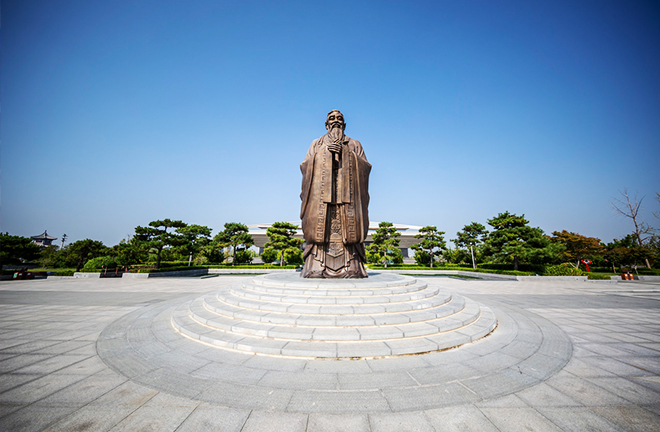Academics explore Confucianism’s value in modern society

A statue of Confucius at the Confucius Museum in Qufu, Jining, Shandong Province Photo: TUCHONG
On July 11, the Nishan Dialogue on Confucianism, one of the parallel sessions of the 10th Nishan Forum on World Civilizations, was held in Zoucheng, Jining, in north China’s Shandong Province. Scholars in attendance engaged in comprehensive discussions on the value of Confucianism in modern society and revisited Confucian thought traditions.
Contemporary relevance
As a significant component of Chinese civilization, Confucianism has added much breadth and profundity to the civilization with its traditional emphasis on worldly engagement and practical action. Zhu Ruixian, deputy director of the Nishan World Center for Confucian Studies (NWCCS), noted that Confucianism is charming in that it is a philosophy full of vitality. This school of thought always manages to keep abreast of the times and get updated continuously amid the development and changes of thought and culture throughout history. It is highly valuable for solving a wide range of problems in contemporary life and social development.
When the intrinsic contradiction of modernity and consequent crises are increasingly prominent, the potential value of wisdom from the East, represented by Chinese culture, has gradually presented itself. He Zhonghua, a professor from the School of Philosophy and Social Development at Shandong University, said that traditional Chinese culture typified by Confucianism is able to provide inspirations for improving the relationship between humanity and nature and will help improve interpersonal relations and rebuild the social trust system in contemporary contexts.
In the current age, Confucianism is playing a more positive role in advancing inter-civilizational exchanges and mutual learning for its open and inclusive nature. Tang Zhouyan, president of the Shandong Federation of Social Sciences, pointed out that Confucianism is a key bond that can promote exchanges and mutual learning among modern civilizations, paving fertile intellectual soil for fostering modern values alongside an Eastern model for modern life in the modern world.
The notions of “tianxia gui ren” (returning to benevolence within all under Heaven) and “ping tianxia” (pacifying all under Heaven) are edificatory to contemporary “community peace,” said Lee Yun-Hwa, an honorary professor from the Department of History at the Andong National University in South Korea, adding that peace is the fundamental premise for human survival and the common pursuit of various thoughts and –isms.
Confucian practices of tianxia gui ren and the concept’s public nature can foster harmony in society and political order through individual moral consciousness and ethical conduct, particularly by “keji fuli,” disciplining the self and observing ritual propriety, Lee said. Meanwhile, community members’ moral free will and sense of responsibility, in addition to the government’s rule of virtue and just policies, will actualize the ideal of ping tianxia and common good.
Revisiting Confucian culture
Based on his analysis of Confucius’ thought structure, Yang Zebo, a professor of philosophy at Fudan University, proposed re-evaluating Confucianism’s development course through trichotomy, instead of dichotomy. In his opinion, it is necessary to divide Confucian thought elements relating to virtue and good into intelligence, desire, and benevolence, in order to free them from the Western binary thinking model consisting of sense and sensibility. Furthermore, Yang noted that over the span of more than 2,000 years, two schools—the school of benevolence represented by Mencius and the later Learning of the Mind, and the school of intelligence represented by Xunzi and later neo-Confucianism—were derived from Confucianism.
Wu Xiaoming, a professor from the School of Language and Culture Studies at the University of Canterbury in New Zealand, re-examined the “sixin siduan” (four feelings and four original sources) theory put forward by Mencius, a key issue in Confucianism.
As Mencius stated: ceyin zhi xin (the feeling of compassion) is the original source of ren (benevolence); xiuwu zhi xin (the feeling of shame and dislike) is the original source of yi (righteousness); cirang zhi xin (the feeling of reverence and respect) is the original source of li (ritual propriety), and shifei zhi xin (the feeling of right and wrong) is the original source of zhi (wisdom).
According to Wu, this theory of Mencius emphasizes the internality of and moral responsibilities related to benevolence, righteousness, propriety, and wisdom. Further clarifying the internal structure of the thesis will generate more direct inspiring moral power to guide contemporary people’s acts from the perspective of moral responsibility.
The event was co-hosted by the Shandong Academy of Social Sciences, Shandong University, the NWCCS, and the Jining Municipal People’s Government.
Edited by CHEN MIRONG

 PRINT
PRINT CLOSE
CLOSE